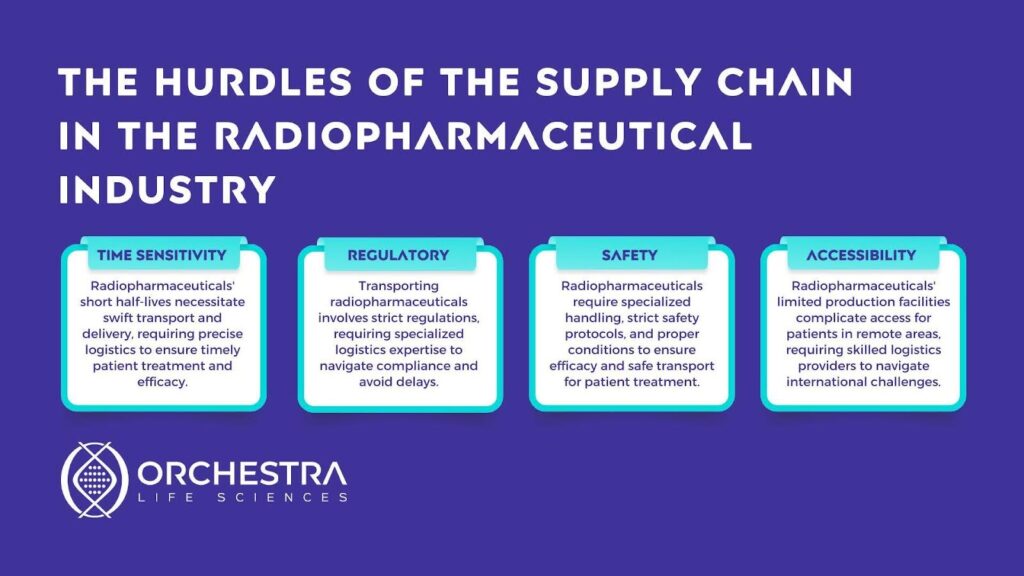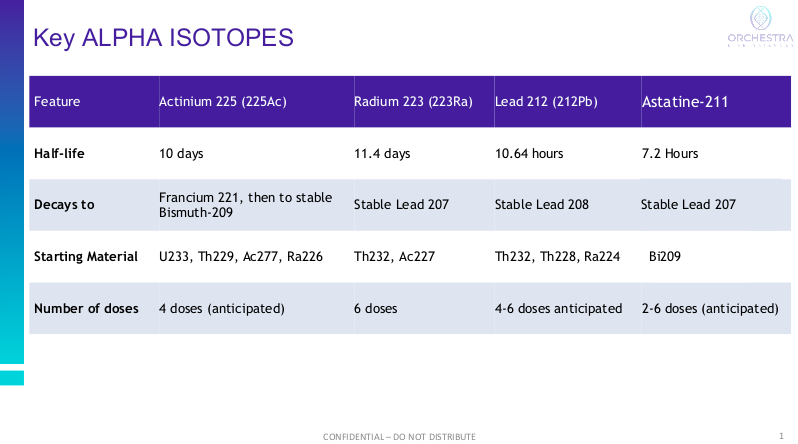Radiopharmaceuticals Are Changing the Game
Radiopharmaceuticals are at the forefront of modern medicine and are changing the way we fight complex cancers. These novel compounds are leveraged to create cutting-edge therapies, like radioligand (RLT) and targeted alpha therapies (TAT). They offer a highly precise way to deliver radiation directly to cancer cells, minimizing damage to surrounding healthy tissue. However, their effectiveness relies on timely delivery due to their short shelf life and sensitivity. This makes the supply chain for radiopharmaceuticals a critical part of patient treatment, where any delay can significantly impact outcomes.

Managing Half Life & Time Sensitivity
One of the most pressing challenges in the radiopharmaceutical industry is the time-sensitive nature of treatments. Because of the rapid decay of the isotopes, they often have extremely short half-lives from just hours to days. This means that once produced, they must be transported and delivered swiftly to ensure they retain their therapeutic efficacy. Any delays during transport or processing can render a shipment unusable, causing potential delays in patient treatment. Managing this intricate process requires a logistics provider that understands the delicate timing involved and can coordinate across production and treatment facilities to ensure uninterrupted care.

Regulatory Compliance with Radioactive Materials
Transporting radioactive materials, including radiopharmaceuticals, is heavily regulated, with stringent guidelines imposed at both national and international levels. This presents significant challenges to logistics providers, as navigating the web of regulations requires specialized knowledge and experience. Regulatory hurdles such as customs checks, licensing, and permits can lead to potential delays, further complicating the already tight delivery timeline. Failure to meet compliance requirements can result in costly holdups and missed deadlines, which in turn jeopardizes patient access to critical treatments. To mitigate regulatory missteps and avoid these pitfalls, partnering with a logistics provider with deep expertise in regulatory matters is essential.
Handling and Safety Requirements
Radiopharmaceuticals are hazardous materials that require specialized handling. The transport process requires proper radiation shielding, precise temperature control, and adherence to strict safety protocols. Only trained personnel can handle these shipments, as any misstep can compromise product integrity, endanger logistics staff, and put patients at risk. Additionally, maintaining the appropriate environment throughout transit is vital. Fluctuations in temperature or exposure to improper conditions can reduce the efficacy of radiopharmaceuticals, making them unsuitable for therapeutic use. Meeting these handling requirements is essential to ensuring that the product arrives at its destination intact and ready for immediate administration to the patient.
Global Access and Distribution of Life Saving Medicines
The critical isotopes required to produce radiopharmaceuticals are produced in a limited number of specialized facilities worldwide. This creates a challenge when trying to reach patients in remote or underserved regions. The logistical hurdles of coordinating international shipments, managing time-zone differences, and handling customs clearances can be overwhelming. Overcoming these challenges requires a logistics provider with a global network, capable of coordinating between production sites and treatment centers across borders with minimal disruption.
Life Couriers: Overcoming Supply Chain Hurdles
In the face of these considerable challenges, Life Couriers, a partner of Orchestra Life Sciences, stands out as a global leader in the radiopharmaceutical logistics industry. Specializing in the time-sensitive transport of medical isotopes and radiopharmaceuticals, Life Couriers brings a unique combination of experience, technology, and reliability. Their global network ensures that treatments can be delivered wherever they are needed, while Real-time Control Towers offers full transparency throughout the shipping process.
Life Couriers has an industry leading first time delivery success rate, ensuring critical therapies reach patients on time, every time and has built such a reputation for overcoming the challenges of radiopharmaceutical logistics. Their expertise in handling regulatory compliance, safety protocols, and international coordination allows healthcare providers to focus on what matters most, delivering life-saving treatments to patients. By minimizing delays and ensuring that radiopharmaceuticals maintain their integrity during transit, Life Couriers plays a vital role in making sure patients receive timely, effective care.
A Path Forward for Radiopharmaceutical Logistics
The hurdles in the radiopharmaceutical supply chain are complex, from strict timelines and regulatory requirements to safety protocols and global distribution challenges. However, as the demand for these novel therapies continues to rise, the need for robust and reliable logistics solutions has never been more crucial. Innovation in supply chain management, combined with strategic partnerships between logistics experts like Life Couriers and developers, is the key to ensuring that patients receive the treatments they need when they need them. As the industry evolves, these collaborations will play an essential role in improving patient outcomes and advancing the future of medicine.

